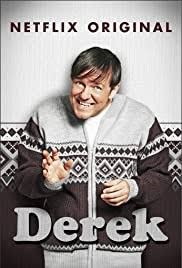Both Seasons Available to watch on Netflix
@SunetraSenior

This underappreciated sitcom by writer & actor Ricky Gervais is benignly special. The series revolves around a possibly autistic carer who works at an old people’s home and straddles the line between bold characterisation and editorial insight with exactly the right poise. Gervais’ trademark satire continues to shine but this time comes from a place of strong social responsibility. As with the comedian’s first hit show, The Office, lesser-known series, Derek, uses the mockumentary style to gleefully subvert common civic stereotypes. However, instead of poking fun at a feckless boss and cringing at his vainglorious choices, Gervais celebrates Derek’s unique wisdom where we laugh along with the protagonist’s enlightening wit.
In lieu of a dominant character whose capacity for incompetence and insecurity is near unfathomable, we are shown somebody with an apparent learning disability stirring motivation and embodying an enjoyable moral compass. In a particularly ticklish bit, Derek (Ricky Gervais) is shown struggling to understand a joke, but as the person walks away, he tells us: “oh I do get it, I just like messin’ with him.” Gone is the talking head of the disgruntled secretary complaining to camera: Derek’s co-workers give him affection and praise in abundance. Such creative inversion goes behind the scenes. Gervais’ usual figure of ridicule, Karl Pilkington, the parodic focus of shows such as An Idiot Abroad, is actually the voice of reason in Derek, playing a supportive friend.
Again, the humour remains recognisably intact; the dry retorts for which we love Karl so much are consistent but placed in a socially conscious setting e.g., when he is assessed in his role as the janitor in the series and quizzed about his qualifications, he comments: ‘I fix stuff that’s broken, why make such a drama of it?’ Derek’s big-heart brings the old people’s home alive: he stays awake with the residents so that they can comfortably sleep, champions his colleagues and generally treats others as he would his own mother. An emotional epicentre is common to Gervais’ works, most famously in his Christmas specials, but never to this extent. The show is dedicated to raising awareness about care for the elderly without compromising the relatability of the storytelling. We are given a real, almost journalistic window into the daily issues that a state-funded care-home faces: “almost 90% of old people die within 6 months of being re-homed,” hard-working manager, Hannah, (Kerry Godliman) explains to us when brutal cuts are made to the home’s administrative budget; threatening to dislodge the vulnerable occupants.
The staff must also combat social prejudice: “because they are old, poor and weak people forget about them”. Further to this, there is a definite yet unassuming class commentary. The drama itself is set within a working-class context and a couple of episodes have underprivileged minor offenders doing community service where Hannah inclusively encourages them to help out. In another pivotal episode she is shown running into an old school friend where the whole concept of conventional progress is turned on its snobby head. The contemporary shames Hannah for what she sees as ‘dead-beat’ colleagues and an ‘underachieving’ lifestyle to which Derek responds: “maybe Hannah hasn’t done everything she wanted but that’s because she always thinks of other people first.” The compassionate local leader’s role is triumphantly juxtaposed with that of a high-earning corporate career woman. The series emphasises that valuable work does not often entail private profit or an ostentatiously snazzy suit. Being authentic, sensitive and cooperative are the superior social merits: “kindness is magic.” Hannah mutually says of Derek: “she (the awful school mate) only ever talks about herself (…) you make a living from what you get, but you make a life from what you give. Derek earns nothing but gives everything.”
Any starkness in the series is ultimately offset by this wider uplifting truth. Another way in which Derek fleshes out the latent in Gervais’ earlier projects: where Extras’ misanthropic Andy Millman comes to acknowledge that his best friend Maggie has been the true treasure all along, Derek and his colleagues collectively confide sentiments that finally forward the fundamental of community. Indeed, as we absorb the fact that privileged individuals could escort their mothers to a care home despite a “six-figure income and five-bedroom house,” it is clear that being a vessel of such profligate culture is what makes one inwardly empty and completely lost. Shockingly insecure, in deprioritising the connection to others, they have undermined the relationship with themselves. In this way, Derek shows happiness as subjective: it is not about whose life-style is better but who can honestly identify and appreciate what essentially matters.
The series shows unconventionally beautiful people who can tangibly bring the joy into each other lives. A feel-good soundtrack including nineties nostalgic hit, Len’s Steal My Sunshine, crystallises this melting of poignant into the overarchingly positive. Some find Gervais’ work mawkish, but we see genuine sympathy with absence of pretension. With storylines that divide the spotlight between main characters equally, sincere commitment to a role that could easily err on tasteless and a mood that’s as profound as it is jocular, Gervais’ Derek is not only a pleasure to watch as a comedy-drama, but a testament to the creator’s dexterity as a masterful ‘en’ertainer.’

Sunetra (Sunny) is an indie journalist, actress and short film writer. She is a popular columnist at a London weekly, and writes extensively on social democracy, Feminism and the psychological nuances of modern society. Her movies have been screened at the London Short Film Festival (LSFF) and Bristol Independent Short Film Festivals (BISFF).
Her progressive, perceptive writing cuts across film, current analysis and media. Known for its unerring emotional intelligence, the work focuses on the socio-politically urgent yet unseen. She enjoys combining arts, news and mindfulness to create a unique perspective, championing social change. In 2019, she was published in Oxford University’s journal, PHENOTYPE, investigating the relationship between apex dinosaurs and modern economy!
Sunetra specialises in the area of psycho-social evolution. To this end, her Sunshine Reviewing column salutes film, television and media that radiate a uniquely joyful message. Enjoy!
T: @SunetraSenior

